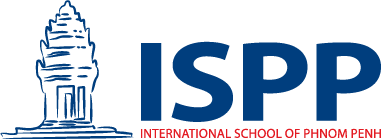Diploma Programme
The International Baccalaureate (IB) Diploma Programme (DP) is acknowledged by universities worldwide as the best and most rigorous academic programme available for Grade 11 and 12 students. This is why IB Diploma holders gain admission to top universities around the world. ISPP has the oldest and most established IBDP Programme in Cambodia.
ISPP teachers are experienced IB-trained educators, many of whom are IB examiners, IB school accreditation visitors and IB professional development workshop leaders. This means students and parents can be assured there is an excellent record of success in gaining students entry to some of the world’s most prestigious universities.

Ms Lucie Lecocq-Otsing
Diploma Programme Coordinator
Diploma Programme Curriculum Framework
At ISPP, the IB Diploma Programme (IBDP) balances subject breadth and depth in six areas. Students consider the nature of knowledge across disciplines through the unique Theory of Knowledge course. Critical understanding, philosophical reflection and international-mindedness are nurtured, starting with a foundation in students’ own language and culture. They develop a positive attitude, self-reliance and become well-adapted to learning that supports them towards university study. The IB Diploma has a reputation for its rigorous external assessment with published global standards. This is a qualification welcomed by universities worldwide.
This is a two-year programme in which students choose six subjects from six group areas – Literature, Additional Language, Humanities, Science, Mathematics and the Arts. Three subjects are studied Higher Level and three are studied at Standard Level. Students are assessed through a mixture of internal assessment (coursework) and external assessment (final exams).
In addition, the programme has three core requirements that are included to broaden the educational experience and challenge students to apply their knowledge and understanding.
The Extended Essay is a requirement for students to engage in independent research through an in-depth study of a question relating to one of the subjects they are studying.
Theory of knowledge (TOK) is a course designed to encourage each student to reflect on the nature of knowledge by critically examining different ways of knowing (perception, emotion, language and reason) and different kinds of knowledge (scientific, artistic, mathematical and historical).
Creativity, Activity, Service requires that students actively learn from the experience of doing real tasks beyond the classroom. Students can combine all three components or do activities related to each one of them separately.
Around 90% of eligible students at ISPP choose to take the IB Diploma each year.
ISPP Diploma
The ISPP Diploma is a qualification taken by all ISPP students; it is based on the US High School Diploma. This is a qualification that students obtain while studying the IB Middle Years Programme (IB MYP) in Grades 9 and 10 and the IB DP in Grades 11 and 12. The ISPP Diploma is awarded on a semester credit system from Grade 9 to Grade 12. It is accredited by the Western Association of Schools and Colleges, a North American based accrediting agency. For more information visit: https://www.acswasc.org/
Secondary
University Entry
The IB Diploma has a proven track record of gaining ISPP graduates access to universities worldwide. ISPP graduates who want to go to university are successfully placed with guidance from the College Counsellor and the Diploma Coordinator. A full list of university and college acceptances for our most recent graduation classes can be found in our academic profile.


Diploma Programme Subject Choices - 2023-24
The following subjects are offered for study in the IB Diploma Programme at ISPP. All subjects are provided at both Standard Level (SL) and Higher Level (HL) unless otherwise noted. Please note the following guidelines when selecting subjects:
- Students must select 6 subjects in total,
- Students wishing to be full Diploma candidates need 3 at HL and 3 at SL
- All new students will need to sit a math placement test
- Students can only choose English B with appropriate English Language documentation (such as test results)
- Students may not study their mother tongue as Language Acquisition (Group 2)
- Subject choices may change depending on the timetable, teacher availability or class sizes. A class size of five students is the minimum required for a viable class.
- All subject choices must be approved by the IB DP Coordinator
Here are the subjects offered at ISPP based on student selection:
| Subject Group | Subjects Offered |
|---|---|
| Group 1* Studies in Language and Literature |
|
| Group 2 Language Acquisition |
|
| Group 3 Individuals and Societies |
|
| Group 4 Science |
|
| Group 5 Mathematics |
|
| Group 6 The Arts or Second Science |
|
* Students may select two Group 1 subjects. In this case, they do not need to select a Group 2 subject.
** Availability at HL depends on the number of students choosing the subject
*** currently French or Spanish Ab Initio can be offered but which language is offered is dependent on the number of students choosing the subject
**** Pamoja is the official online provider for some IB courses. If students are interested in studying a Pamoja course, they will need to complete an application form to ensure they are able to cope with the demands of an online learning environment. There are additional costs involved for families.
Diploma programME faqs
At ISPP we encourage all students who are capable to undertake the full IB Diploma Course. For other students we offer ISPP High Courses (accredited by WASC) as well as IBDP certificate courses.
The IB Diploma is very highly regarded all over the world. It is generally considered to be the best and most rigorous pre-university qualification. More information on the IB Diploma in individual countries can be found at https://www.ibo.org/recognition/
Each subject has its own summative assessment criteria which can be found in the subject guide published by the IB. Assessment is typically two thirds external assessment (exams) to one third internal assessment (coursework). The IB Diploma is scored out of a total of 45 points, including seven points for each subject. Six subjects are taken; three at standard level, three at higher level (42 points). Three additional points are available for the core; the Extended Essay (EE), Creativity, Activity and Service (CAS) and Theory Of Knowledge (TOK).
Yes, all students complete these important aspects of the IB Diploma. Those students not taking the full IB Diploma may elect to enter any of the three core components for IB external assessment. ISPP Diploma only candidates will complete these three areas but for assessment internally at ISPP.
The Diploma Programme is ideal preparation for university, for its international qualification, and academic breadth and depth. For more information about the many ways that the DP programme prepares students for University, click here.
This question cannot be simply answered with a yes or no. It depends on the university and the chosen programme of study within that university. It also depends on the pool of applicants that the particular university gets in a given year.
In general, universities look for students who have been successful in their chosen programme and who have chosen the most rigorous programme for which they could reasonably be successful. Therefore, since the IB Diploma is one of the most recognised and rigorous, passing with high marks places a student in a highly competitive ranking.
There is a list of universities and other tertiary institutes across the world that recognize the IB and their policies for doing so on the IB website.
There are more than 1,800 universities representing 90 countries currently in this directory, but many other universities also admit IB diploma holders. Each university usually has a contact e-mail of the person responsible for the IB recognition. Additionally, the IB maintains summary policies of universities in the US, Canada, and Australia. Please always check with the university directly.
Full details are available at http://www.ibo.org/recognition/
© International Baccalaureate Organization 2010.
Learn More
Click on a topic below to learn more about our secondary education programme.
Footer
Join Us
Make an inquiry or schedule a tour to find out more about our beautiful campus and unique education programmes.
